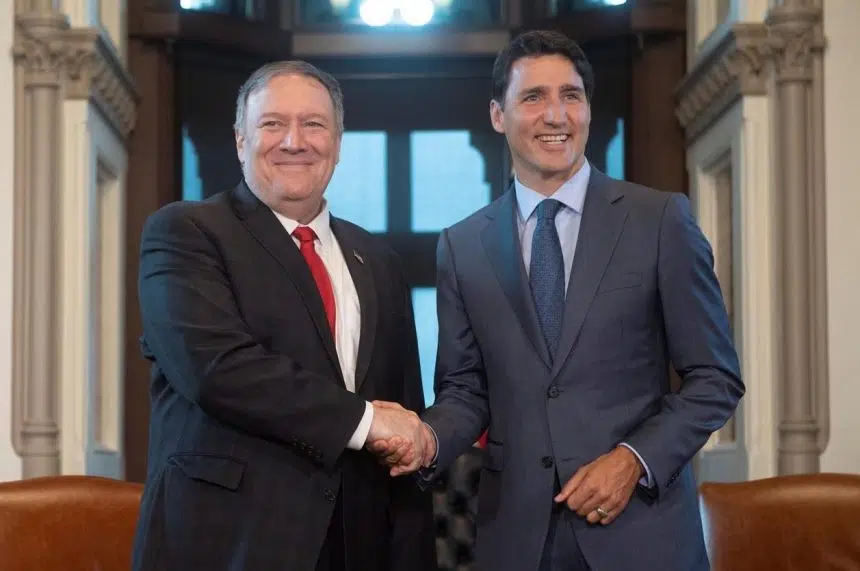OTTAWA – U.S. Secretary of State Mike Pompeo is taking direct aim at how China has tied the detention of two Canadians there to the arrest in Canada of a Chinese tech executive, saying the issues are not “morally similar” in any respect.
Canadians Michael Kovrig and Michael Spavor have been held in China since shortly after Canada arrested Huawei executive Meng Wanzhou at the request of American authorities.
Meng is awaiting extradition to the U.S. to face allegations of fraud in violating Iran sanctions.
China said Thursday that the fate of the two Canadians, and the increasing difficulties in China-Canada relations, is Canada’s fault and linked to Meng’s detention.
At a press conference in Ottawa, Pompeo said China’s arbitrary detention of the two Canadians was “fundamentally different as a human rights matter, as a rule of law matter” than Meng’s extradition case.
“These are fundamentally different matters than the Canadian decision to use their due process and the rule of law to behave in a way that’s deeply consistent with the way decent nations work,” Pompeo said.
Connecting the two issues is “what China wants to talk about,” he said.
“They want to talk about these two as if they are equivalent, as if they’re morally similar, which they fundamentally are not.”
He said U.S. President Donald Trump made “unambiguous” his country’s concern about China’s “inappropriate behaviour” in a recent meeting with Chinese President Xi Jinping. He added that American officials have made the case to Chinese counterparts and engaged in “other diplomatic activity” to make the case for Kovrig and Spavor.
“And we’ll continue to do that until such time as they’re home and returned to their families.”
Foreign Affairs Minister Chrystia Freeland said any decisions about Meng’s case would be left to civil servants and the criminal justice system as it ought to be. Meng’s future, Freeland said, would not be a political decision.
Questions about China loomed over Pompeo’s first official visit to Ottawa as Trump’s top diplomat. China was on the agenda when he met with Prime Minister Justin Trudeau, one of a number of hot-button issues the two discussed ahead of the upcoming G7 summit this weekend.
Trudeau thanked the U.S. for its support in working on the release of Spavor and Kovrig during brief remarks ahead of the closed-door meeting, and said he looked forward to discussions about how they could move ahead with getting the two men released.
Canada and the U.S. are locked in differing battles with Beijing – the Americans over trade issues, primarily, while Canada is in a diplomatic dance over Kovrig, Spavor and China’s decision to block imports of some Canadian agricultural products.
The Trudeau Liberals and the Chinese government have traded escalating jabs since Canada’s joint statement with the European Union on the current unrest in Hong Kong over the weekend.
The Chinese government has effectively told Canada to butt out, and that its internal affairs are none of Canada’s business.
Trudeau fired back Wednesday during a speech on foreign policy where he emphasized Canada wasn’t going to back down, not on the case of Kovrig and Spavor, and not on the need to safeguard the human rights and freedoms of the 300,000 Canadians in Hong Kong and the rest of the people there.
The war of words continued Thursday when a Chinese foreign ministry spokesperson responded.
“Loudness is not necessarily persuasive and people can tell right from wrong,” said Geng Shuang, according to an English transcript of a news conference published online.
“We urge the Canadian side to reflect upon its wrongdoing, take China’s solemn position and concerns seriously, immediately release Ms. Meng Wanzhou and ensure her safe return to China.”
Teresa Wright, The Canadian Press







